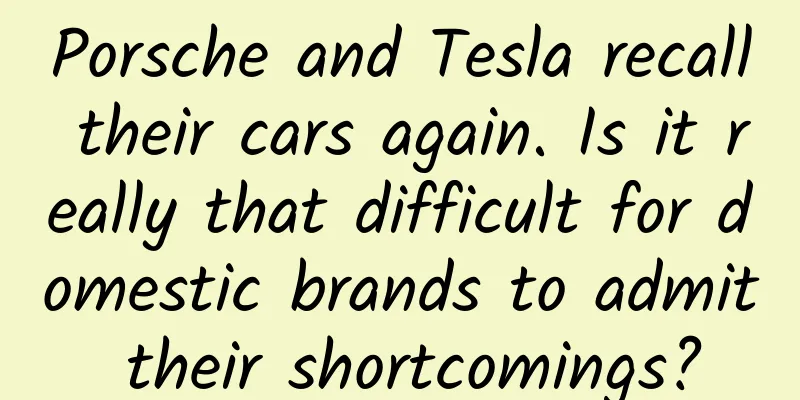Porsche and Tesla recall their cars again. Is it really that difficult for domestic brands to admit their shortcomings?

|
Recently, Porsche announced the recall of some imported Cayenne cars produced between May 9 and June 19, totaling 3,780 vehicles. The recall was due to the use of incorrect raw materials in the forging process of these models, which may cause cracks in the upper left trailing arm of the front axle, affecting the vehicle's handling performance and increasing the risk of vehicle collision. Almost at the same time, Tesla announced a recall of some imported Model S and Model X, as well as domestically produced Model 3 and Model Y, with production dates between October 15, 2020 and July 17, 2024, totaling 1,683,627 vehicles. This is Tesla's largest recall in China ever, involving almost all of its models. The reason for Tesla's recall this time is that after the front trunk of some vehicles is unlocked, the latch assembly system may not be able to detect the unlocked state, so the vehicle cannot issue a "front trunk is not locked" prompt. In extreme cases, the front trunk will suddenly open during driving. From Porsche to Tesla, this level of recall is commonplace for domestic consumers. Almost all mainstream joint venture brands have conducted similar recalls. In sharp contrast, why do domestic brands seem to rarely conduct recalls? It is actually a common topic in the industry that domestically produced cars are rarely recalled. Whether it is the scale of recall or the number of recalls, the intuitive numbers are far lower than those of joint venture manufacturers. 91che checked the data of the recall center of the State Administration for Market Regulation. In the past month, in addition to Tesla and Porsche mentioned above, Mercedes-Benz, Ford, Stellaris, Peugeot Citroen, Yueda Kia, Chery Jaguar Land Rover, GAC Toyota, Lexus and other brands have also filed recall plans, almost all of which are joint venture brands; among domestic brands, only BAIC Blue Valley conducted a small-scale recall plan totaling 3,418 vehicles due to poor raw material quality of the corrugated clips that fix the brake hose. The recall is due to defects in the initial design and manufacturing of the car. So, why are there so few recalls of domestic brands and so many recalls of joint venture manufacturers, and there is a geometric difference between the two. Is it because the quality of domestic cars is far superior to that of joint venture cars? In recent years, the quality of domestically produced cars has improved rapidly, and consumers have become more and more recognized. However, common sense tells us that it is basically impossible for domestically produced cars to surpass joint venture cars in quality at almost the same industrial level. It is impossible for you to make one pound of fried dough sticks while he makes one pound and two ounces of dough. This does not conform to the law of conservation of energy. In the same market environment and facing the same group of consumers, why is there such a big difference in recalls between domestic cars and joint venture cars? This is primarily determined by the development process of the Chinese and foreign automobile industries, namely the so-called "national conditions." The global automotive recall system can be traced back to the 1960s. In 1966, the United States passed the National Traffic and Motor Vehicle Safety Act, which was the legal basis for the world's earliest automobile recall system. Subsequently, other countries and regions introduced similar systems. China’s automobile industry started relatively late, and the formulation of laws related to the automobile industry lagged behind. It was not until 2004 that the relevant Chinese authorities issued the “Regulations on the Management of Defective Automobile Product Recalls”, which initially established an automobile recall system, but it was not until 2013 that it was fully implemented. It is only in the past decade or so that Chinese manufacturers and consumers have become familiar with and willing to accept the automobile recall system. In the past, when quality problems arose, automobile manufacturers were more willing to resolve them through targeted individual services rather than large-scale public recalls. Perhaps it is because the recall system was implemented relatively late, and large-scale recalls will bring huge costs. It will take time for domestic automakers to accept it, so they are not willing to take the initiative to recall. In addition, Chinese consumers do not know enough about the recall system and often equate recalls with "poor quality". This mentality also makes domestic manufacturers unwilling to hastily recall. In addition, the relevant national departments do not have strict supervision over the automobile recall system. Unless major quality problems occur, recalls are generally not mandatory. Each country is at a different stage of development of the automobile industry, and there are obvious differences in the enforcement of the automobile recall system. The US automobile industry was already the world leader before World War II, but the official implementation of the automobile recall system was not until 1966; the European Union did not pass the "EU Automobile Recall Regulation" until 2001, only three years earlier than China. What we can see is that China's relevant systems are actually constantly being improved, and the recall awareness of domestic manufacturers is gradually increasing. Since 2024, many domestic brands have recalled products. In the first half of 2024, Changan Automobile recalled 203,414 second-generation Changan CS55PLUS, BYD recalled 16,666 Seagulls, Chery Automobile recalled 3,037 Tiggo 5Xs, and JAC Motors recalled 1,266 JAC iEVA50s, which are all typical cases of domestic car recalls. To be honest, compared with joint venture manufacturers, there is still a huge gap in the implementation of the recall system for domestic cars. In the first half of 2024, manufacturers such as Wenjie, Xiaomi, Ideal and BYD have successively exposed quality problems of varying sizes, but none of them have conducted recalls. Statistics show that there were 68 auto recalls in China in the first half of 2024, of which less than 10 were domestically produced, and the market share of domestically produced cars has approached 60%. The data is stark. The Chinese auto market already has the sales foundation to strictly implement the recall system. The relevant departments should now increase supervision of domestic manufacturers. The brand reputation advantage that has been hard-earned may be lost due to the failure to implement the system. More importantly, joint venture brands conduct various recalls all year round, and their brand image has not only not been affected, but has become more prominent. Let me end with a popular internet phrase: Is it really that difficult to admit your own shortcomings? As a winner of Toutiao's Qingyun Plan and Baijiahao's Bai+ Plan, the 2019 Baidu Digital Author of the Year, the Baijiahao's Most Popular Author in the Technology Field, the 2019 Sogou Technology and Culture Author, and the 2021 Baijiahao Quarterly Influential Creator, he has won many awards, including the 2013 Sohu Best Industry Media Person, the 2015 China New Media Entrepreneurship Competition Beijing Third Place, the 2015 Guangmang Experience Award, the 2015 China New Media Entrepreneurship Competition Finals Third Place, and the 2018 Baidu Dynamic Annual Powerful Celebrity. |
Recommend
With rich educational resources and interesting voice interactions, Alpha Super Egg will make your children fall in love with learning.
"I hope my son will become a dragon and my d...
"You can't live without being crazy!" How do weasels evolve the "soft power" that you can't imagine?
In this age when humans go crazy from time to tim...
The "Tianshan Child-like Grandma" of the Animal World: I don't want to grow up...
Produced by: Science Popularization China Author:...
Enron Gold Medal Personal Training Program: Ten Lessons to Help You Master Personal Training
Enron Gold Medal Personal Training Program: Ten L...
Velocity Official Guide - Using Velocity
[[143748]] If you are using VelocityViewServlet o...
The "Nine-grid" traffic light is a misunderstanding! What happened to the traffic lights to become like this?
Recently, the "Nine-grid" traffic light...
Guangzhou recipe mini program function, how much does it cost to develop a home cooking mini program?
As those born in the 1990s and 2000s have started ...
The underlying logic of user growth positioning!
There is a strange phenomenon. Internet companies...
What is short video operation? What does short video operation do?
The popularity of Tik Tok has redefined the mobil...
"Naruto" ends: Is the domestic Naruto industry chain also over?
Have you ever watched "Naruto"? This co...
Re-understanding the R8 compiler from an online question
background In the past period of time, JD Android...
Understand Tencent Guangdiantong Advertising in one article
In the past few years, I probably contributed nea...
Korla Mini Program Development Company, how much does it cost to develop a digital mini program?
More and more businesses are paying attention to ...
Just because you have a 4K TV doesn't mean you can watch the World Cup in 4K
The World Cup is in full swing. This highly antic...









